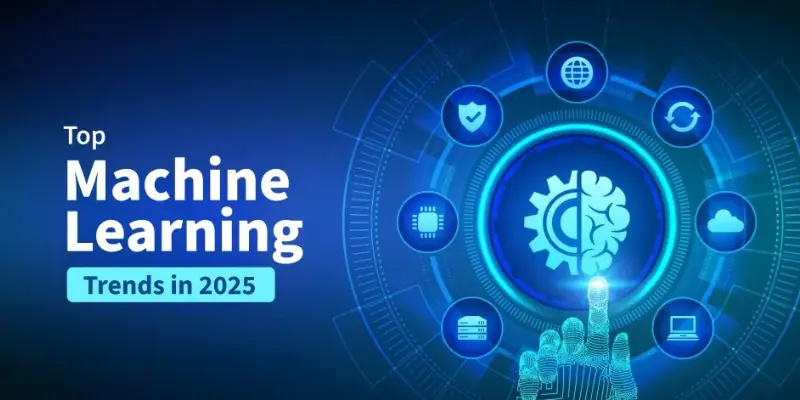
Machine Learning has transformed from a niche research field into a mainstream driver of innovation across every industry. As we enter 2025 and beyond, the future of Machine Learning looks more promising than ever. Machine learning is influencing the next stage of technology development with its capacity to evaluate data, identify patterns, and provide predictions. From healthcare and finance to manufacturing and education, its applications are broad, intelligent, and rapidly evolving.
In this blog, we’ll explore the direction ML is taking, highlight the latest advancements, discuss the best tools and libraries for machine learning, and guide aspiring professionals on how to prepare for this exciting future.
The Growth of ML Across Industries
In 2025, Machine Learning is no longer a futuristic idea it’s a core component of digital transformation. Industries like healthcare are using ML to predict patient outcomes, recommend treatments, and personalize medicine. In finance, ML algorithms are handling fraud detection, credit scoring, and algorithmic trading. The automotive sector is using ML for autonomous driving, while e-commerce is leveraging it to deliver hyper-personalized customer experiences.
One significant development is the rise of edge computing, where ML models are deployed on devices like smartphones and IoT sensors for faster decision-making without relying on cloud servers. This makes ML even more integrated into our daily lives, from voice assistants to smart appliances.
Trends Defining Machine Learning in 2025
1. AutoML and Democratization of ML
Automated Machine Learning (AutoML) tools are simplifying the creation of ML models. Non-experts can now build powerful models without deep coding knowledge. This democratization is allowing startups, small businesses, and non-tech professionals to integrate ML into their operations.
2. Generative AI
Generative AI is now used beyond content creation it’s helping design new materials, compose music, and simulate complex biological systems. In 2025, we’ll see even broader usage of these generative machine learning models.
3. ML Regulation and Ethical AI
As ML systems become more embedded in society, ethical concerns are gaining importance. Governments and companies are placing greater emphasis on transparent algorithms, fair data usage, and responsible AI practices. There’s a growing demand for ML models that can explain their decisions especially in healthcare, law, and finance.
4. Federated Learning and Data Privacy
With increased focus on data privacy, federated learning is becoming popular. This technique allows ML models to train across decentralized devices without transferring sensitive data. It’s especially impactful in fields like healthcare, where data privacy is a top concern.
Future Career Opportunities in Machine Learning
Professionals in machine learning are finding increasing employment. Roles like Machine Learning Engineer, AI Researcher, Data Scientist, MLOps Engineer, and AI Product Manager are in high demand across sectors. Companies are seeking experts who not only understand ML algorithms but can also deploy, maintain, and improve them in real-world settings.
Students and professionals looking to break into this field can benefit greatly by enrolling in specialized programs like a Machine Learning Course in Chennai offered by FITA Academy. These courses provide hands-on training in Python, TensorFlow, deep learning, and real-world ML projects, equipping learners with practical experience aligned with industry needs.
Challenges Machine Learning Will Face in the Future
Despite its rapid adoption, Machine Learning will face several key challenges going forward:
- Data Quality and Quantity: Models rely on clean, representative datasets. Poor data leads to biased or inaccurate predictions.
- Model Explainability: Complex models like deep neural networks are often “black boxes,” making it hard to understand how decisions are made.
- Scalability: As more data becomes available, scaling models efficiently without massive compute resources remains a challenge.
- Bias and Fairness: Algorithms can perpetuate societal biases if trained on flawed datasets. Ensuring fairness across diverse user groups is crucial.
- Security Threats: Adversarial attacks and model manipulation techniques pose serious threats to the integrity of ML systems.
Being aware of these Challenges in Machine Learning helps professionals develop responsible and robust solutions that serve a diverse, global audience.
The Rise of Specialized and Hybrid Models
Looking ahead, we’re seeing a shift from general-purpose models to more specialized or hybrid models tailored for specific industries. For example, healthcare-specific AI models are being trained on medical images, while finance-focused models analyze stock trends and risk factors.
Moreover, multi-modal learning, which combines text, images, video, and audio, is growing rapidly. This trend allows AI systems to understand context better and provide more accurate outputs. Think of virtual assistants that not only understand your voice but also recognize your gestures or facial expressions.
Preparing for the ML-Powered Future
To stay ahead, professionals should focus on:
- Continuous Learning: Stay updated with emerging algorithms, tools, and frameworks.
- Project-Based Learning: Build and deploy real-world models on platforms like Kaggle and GitHub.
- Domain Knowledge: Combine ML skills with domain expertise (e.g., ML in agriculture, law, or finance).
- Networking and Collaboration: Join ML communities, attend meetups, and collaborate on open-source projects.
Enrolling in a Training Institute in Chennai can offer the structure and mentorship needed to build foundational and advanced skills in machine learning. Institutes like FITA Academy provide not just theoretical knowledge, but also portfolio-building opportunities through capstone projects and internships.
As we move through 2025 and beyond, Machine Learning is set to play an even more central role in shaping technology, business, and society. With trends like AutoML, generative AI, and federated learning leading the way, the possibilities are immense. However, these advancements come with their own set of challenges ethical, technical, and operational—that must be addressed responsibly.
For students, professionals, and tech enthusiasts, now is the time to sharpen your skills, explore emerging trends, and become part of this transformative journey. Whether you’re just starting out or looking to advance your career, building expertise in Machine Learning will position you at the forefront of the future.
